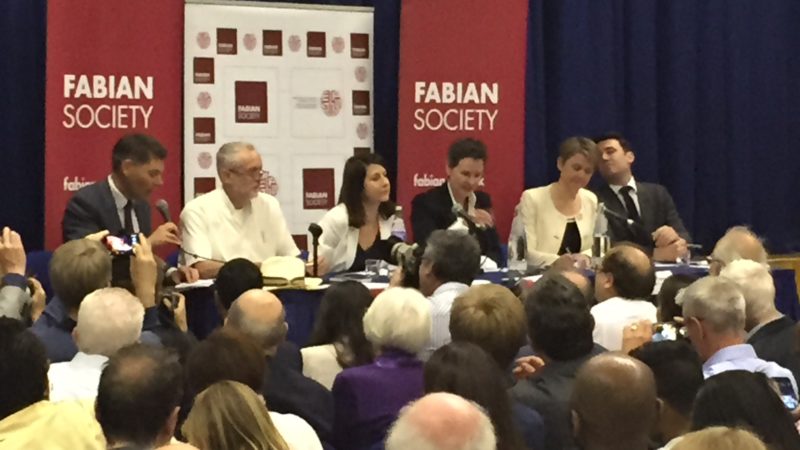
The Labour leadership candidates divided today over whether the party should back the government’s plans to further reduce the benefits cap.
The question elicited the biggest reaction from the audience at the GMB annual congress in Dublin, where the five contenders went head-to-head for over two hours. Chairing the debate, the Daily Mirror’s Kevin Maguire asked if they supported the cut in the ceiling on benefits from £26,000 to £23,000 a year.
Liz Kendall and Mary Creagh said they did support the cut, while Jeremy Corbyn said he opposed it. Andy Burnham and Yvette Cooper, however, were not willing to give a simple yes or no answer. This failure to give a single word answer prompted heckling from the audience
Burnham said it was right that people get more in work than people get in wages but it depends what else they do. Cooper said it is right to have a benefit cap but there have to be additional reforms to stop it being unfair on Londoners and the disabled.
The issue is a sensitive one since Harriet Harman said that Labour was “sympathetic” to a further reduction to the cap in her response to the Queen’s speech.
Answering 14 questions from the audience, the candidates also divided on whether to join a cross-party campaign during the EU referendum campaign. Kendall said Labour should take part in a broad campaign, as well a establishing a separate Labour campaign. Burnhan reiterated his belief that Labour should concentrate on their independent campaign.
However, when asked if they agreed with the shadow foreign secretary, Hilary Benn, who said he would not share a platform with David Cameron during the referendum campaign earlier today, four of the candidates – including Kendall – said they would not either. Only Mary Creagh said that she would: “‘it’s in Britain’s interest.”
The candidates covered a range of subjects, including whether they would campaign against the Transatlantic Trade and Investment Partnership. All said they would work to reform the terms of the contract, apart from Corbyn who said he was opposed to it.
They were also asked if they thought Labour’s manifesto was too left wing. All said no. There was also unequivocal agreement among candidates that they would not take the MPs projected 10% pay rise.
When it came to the closing statements, there were clear distinctions between each of the potential leaders of the party. Burnham stressed his class his background. He also cited his involvement in the Hillsborough campaign for justice as evidence of his willingness to take on the establishment.
Meanwhile Kendall presented herself as the ‘change’ candidate (although this is a mantle they are all vying for, albeit in different ways). She argued that if Labour sticks to the politics of the last election, it will lose.
As the candidate from the left of the party, Corbyn was unapologetic about his anti-war, anti-nuclear weapons stance. He reiterated his belief that Labour needed to pursue an alternative economic strategy.
Creagh used her closing statement to admit that prior to the election she hadn’t planned on standing to be leader (a dig at Burnham and Cooper). Her closing statement drew on an often-heard mantra: let’s make power, wealth and opportunity available to the many, not just the few.
Cooper closed the session – she argued that Labour need a leader who’ll take David Cameron on and who will say that “it was not too many teachers and nurses that caused Lehman Brothers in New York to collapse.” She stressed that women’s rights needed to be central to Labour’s agenda (noting that women have been hit six times harder by the government’s cuts). She ended with a clear statement: Cameron has a woman problem. Let’s give him a bigger one, and elect a woman leader.




More from LabourList
‘Tackling poverty should be the legacy of Keir Starmer’s government’
‘The High Court judgment brings more uncertainty for the trans community’
‘There are good and bad businesses. Labour needs to be able to explain the difference’